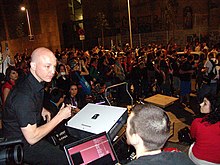James Powderly | |
|---|---|
 | |
| Born | 1976 (age 48–49) |
| Education | New York University, Interactive Telecommunications Program |
| Known for | Street Art, Robotics, and Internet Art |
| Notable work | L.A.S.E.R. Tag, LED Throwies |
| Awards | 2010 Japan New Media Art Festival Excellence Prize, 2010 Ars Electronica Golden Nica in Interactive Art, 2010 Design Museum Brit Insurance Design of the Year in Interactive Art, 2010 Future Everything Award, 2006–2007 Eyebeam OpenLab Senior Fellowship, 2006 Ars Electronica Award of Distinction, 2006, Lower Manhattan Cultural Council, Off the Record Commission, 2005–2006 Eyebeam OpenLab Fellowship, 2005 Eyebeam Artist in Residence |
James Powderly (born 1976 in Chattanooga, Tennessee) is an American artist, designer and engineer whose work has focused on creating tools for graffiti artists and political activists, designing robots and augmented reality platforms, [1] and promoting open source culture.